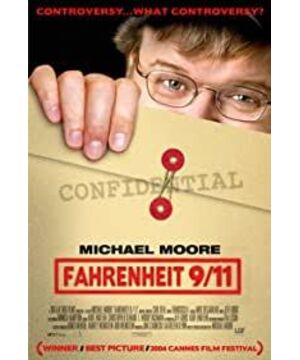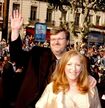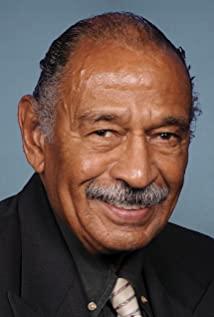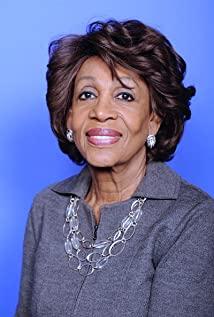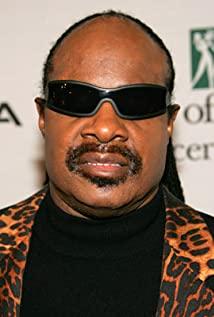At the beginning of the film, it was a scene of Florida voters celebrating Al Gore’s victory in the 2000 US presidential election. There was a joyous scene, but the music was always gloomy and dull, and when the TV screen appeared, the music turned into a joking country guitar. As news screens flashed one by one, Gore’s victory turned into Bush’s final victory. This is a dramatic turning point, which is also hidden in the narration, such as ridicule Ben Afflett and Steve Wanda. And "like a dream" and so on. Narration becomes the main narrative of this documentary, but the absolutely true historical pictures are combined in an unconventional way in the film, forming a new "montage" effect.
"Fahrenheit 911" is not a feature film that is capable of joking. However, even as a documentary, it is definitely difficult to measure by general standards. Among the constituent elements of a conventional documentary, there are real pictures, interviews with the parties, and just right Narration, giving the work an extended space greater than or equal to the meaning outside the painting is the basic feature of a high-quality and sincere documentary. In Michael Moore's works, especially "Fahrenheit 9/11", these elements are not lacking. The campaign TV shows, the pictures of Bush in the White House and various occasions, and the interviews between the parties and the people are all just like fakes. And the narration did not forget to explain the scene while adding extra meaning. At first glance, it seems calm, but in this film, the real images are organically combined into negative teaching materials for the Bush administration, and the interviews with the parties "pointed to the nail on the head" since Bush first became the president of the United States, about 9/11, the war in Afghanistan, and Iraq. The dark scenes of the war, the narration is Michael Moore's magical pen, the cold ridiculous tune, and the picture narrates the relationship between the US government represented by Bush and the disasters of these years. Face the truth.
In the paragraph about the day of the 9/11 attacks, the screen uses images of Bush studying with students at a Florida elementary school. The screen itself has no special meaning. However, Michael Moore used a guided narration to carry out the film. , He said in the narration: "When he was told that the World Trade Center had encountered an attack that terrorists had planned eight years ago, Mr. Bush decided to continue to the school and did not want to miss this opportunity to show his face in public." This is an obviously tendentious tone, and after that, this kind of narration is closely integrated with Bush's live images in the classroom, forming a very convincing audio-visual effect.
When the picture showed Bush's entourage (probably the "Chief of Staff" as the narrator said) coming to whisper to the president, the narrator said: "His chief of staff walked into the classroom and told Bush that the country is under attack." Then the chief of staff. Exit the screen and zoom in to close up Bush’s face. If there is no music and narration, this would be a normal news scene or documentary scene. However, the narration supplemented by a scorching soundtrack said this after the camera stared at Bush’s face for a few seconds. "He didn't know what to do, no one told him how to do it, and no guards took him to a safe place. He didn't just sit there all the time and continue to read'My Pet Goat' with the children." In the narration, Bush’s face was uncertain, sometimes pursing his mouth, and sometimes raising his eyes to look ahead, which was also anxious. However, through the narration, this anxiety was amplified.
This is just one example of the obvious means of expression of "Fahrenheit 9/11". After that, Michael Moore counted the economic entanglements between the Bush family and the rich families in the Middle East, and step by step introduced the relationship between 9/11 and the Iraq War and money.
Objectively speaking, there is nothing wrong with the narrative logic of Fahrenheit 9/11. The angle of cutting into the event can be described as sharp. As a documentary that is anti-mainstream to a certain extent, it can use a new perspective to make a sound of seeking truth. This is The most commendable part of this documentary. However, the work has a considerable degree of political inclination, so that as a documentary, "Fahrenheit 9/11" has lost some objective power. Although there were a lot of visits to the families and soldiers of the Iraq War exhibitors in the film, which made a warning about the stupid war that is recognized in the world, its position is still based on the fact that a lot of tactics have led to the president. Based on the various incidents caused by Bush and his family's "black gold" actions that have caused serious harm to the national interests of the United States and the interests of the people, the goal is still to target the Bush administration. At this point, the passage of the Iraq war is not so much a reflection on the war itself as it is a reflection on the cause of the war. The heavier the sentiment expressed in this passage, the stronger the criticism of the Bush family and the government. In terms of facts, this is a landmark work that breaks through the "documentation" function of ordinary documentaries. A sense of humor and a heavy gesture coexist, forming a "record" belonging to Michael Moore, a clear directional and realistic attitude. Although this perspective and narrative is not biased, it still cannot conceal the preciousness of this pursuit.
From "Fahrenheit 911" and Michael Moore, reviewing world documentaries since the 1970s, behind the diversification of themes, the ever-enriching means of expression, and the sharper standpoint, what is lacking is not the real voice, but the sound. The courage of voice, when Michael Moore uses his camera to talk about things very seriously, but the world that appears in his lens is different from the usual audiovisual, which may have been real but has been ignored by most people. Some of the interests are similar to those expressed in Liang Wendao's "Common Sense": some things are very embarrassing to say, but they don't know that this is actually common sense in life, common sense that is ignored by the collective. When everyone focused on African refugees, Vietnam War veterans, and landmark music festivals, the fat man who used "bowling" to describe the school shootings and proved from the details the absurdity of "4 boxes of matches and 2 lighters can be carried on the plane" is undoubtedly Become a genuine common sense observer, and this is what makes his documentary work different from others.
Another outstanding feature of "Fahrenheit 9/11" is the ubiquitous sense of humor. This sense of humor is not funny and nonsensical. In the "100-mile open coastal border, because of budget cuts, the total number of state policemen protecting the border is only one." Here, after a smile, it is a cold-hearted accusation against the U.S. anti-terrorism system. The successive editing of Bush Sr. and Bush Jr. meeting with Saudi Arabian political and economic figures has caused not only visual dazzling, but also a pile of truthfulness. In recourse, Moore himself always smiled when he appeared in front of the camera. As the director who appeared on the scene, he formed a satirical contrast with the image of Bush in the film.
Such a sense of humor not only belongs to Moore, but he uses this sense of humor to the cutting edge, not only "Fahrenheit 911", including the previous "Roger and Me", "Columbine Bowling" and later "Medical Insider" and "Capitalism: A Love Story", independent spirit and social attention, has never left the documentary director. This is a trend in the development of global documentaries, but it needs more powerful forms to support it, regardless of the position of "Fahrenheit 9/11", As far as the work itself is concerned, it is undoubtedly an excellent example in form. As for the entanglement between film and politics, as well as the relationship between Michael Moore and the conquest of power, they reflect the ideological situation of American cinema in a disguised form. They are still the embodiment of mainstream values, and documentaries are the most subversive film form of ideological discourse. , It is the most likely focus of various contradictions to erupt. Therefore, the "record" of "Fahrenheit 911", from the perspective of the film text, is an attempt to explore the form with a tendency, and from the perspective of social interaction, it is a confrontation between the mainstream and the truth. This Golden Palm, I want to come, more because of the latter.
View more about Fahrenheit 9/11 reviews


